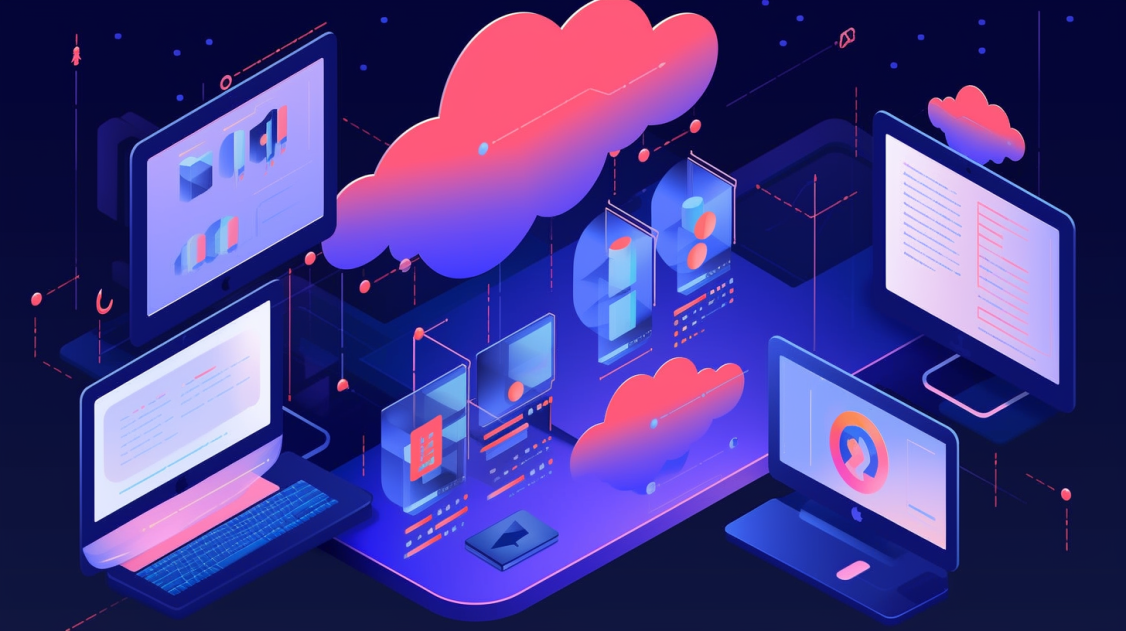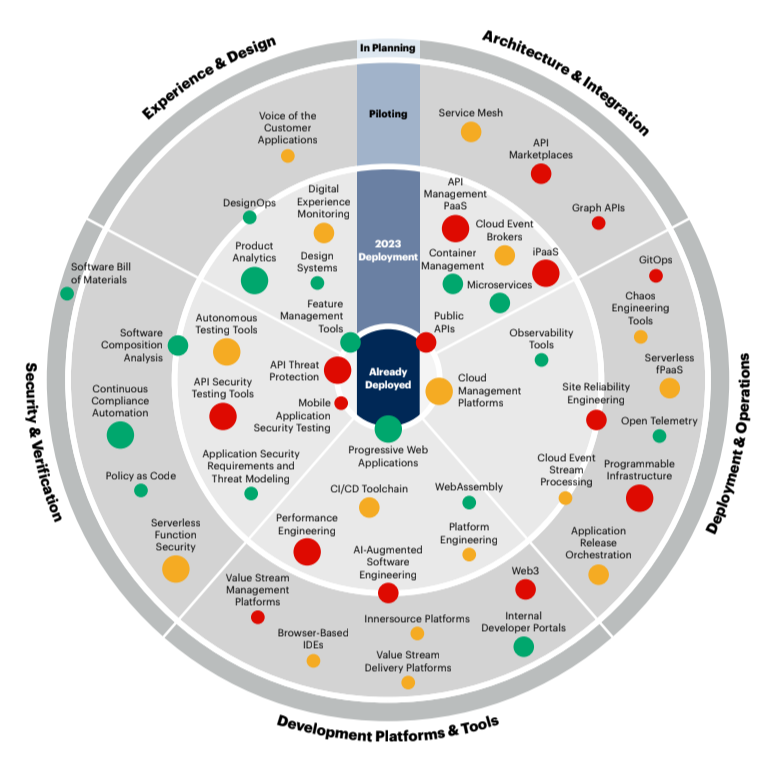
According to the Gartner report entitled '2023 Technology Adoption Roadmap for Software Engineering', Cloud Management Platforms (CMPs) fit into the landscape of Deployment & Operation technologies. These technologies are already widely used in companies and can offer many advantages for Cloud Management.
However, it is important to note that there is still an average risk rate associated with CMP. This risk stems mainly from the possible shortage of experienced professionals in the use of such technologies and the potential security risks that cloud platforms may entail.
Despite these obstacles, the report emphasises how crucial the adoption of Cloud Management Platforms has become in addressing the increasing complexity of application architectures. In fact, although such technologies may entail significant upfront costs, they are increasingly indispensable to remain competitive and adapted to market needs.
What is a Cloud Management Platform?
A Cloud Management Platform, or CMP, plays a key role in the cloud technology ecosystem for businesses. Simply put, a CMP is a sophisticated software system designed to help companies manage and optimise their cloud resources and services, efficiently and effectively.
These platforms are of crucial importance as they allow companies to consolidate control and supervision of cloud resources, such as virtual servers, storage space, networks, security services and more.
CMPs offer a single interface, or control panel, through which companies can monitor, orchestrate and automate all cloud-related activities. In this way, businesses gain complete visibility, in real time, over cloud resources. They thus have the ability to track spending, monitor performance and ensure regulatory compliance.
What are the functionalities of cloud management platforms?
Functionalities form the core of a Cloud Management Platform, providing users with a wide range of tools and capabilities to optimise their cloud infrastructure. Below, we look at each of the key functionalities:
- Cloud resource management: Cloud resource management is the crucial starting point. A management platform enables companies to create, manage and release cloud resources quickly and intuitively, reducing deployment time and improving the scalability of resources when needed.
- Process automation: Cloud management platforms enable companies to define automated workflows, simplifying repetitive and complex tasks. This leads to greater operational efficiency and a reduction in human errors.
- Monitoring and analysis: A CMP provides powerful real-time monitoring tools for cloud resources. Monitoring allows users to detect anomalies early, optimise performance and anticipate future needs.
- Cost management: Cloud resource-related expenses can be tracked, budgets and cost control policies can be defined to ensure accurate and sustainable financial management.
- Security & compliance: CMP offers advanced security features, including role-based access, data encryption and threat monitoring to protect cloud resources.
- Multi-Cloud Orchestration: Many platforms allow managing cloud resources and services from different providers, simplifying the management of heterogeneous cloud platforms.
- Application management: They offer tools for application management, including continuous release and automatic scaling of applications as needed.
- Self-service portals: CMPs often provide customisable self-service portals for end-users and IT teams, facilitating the deployment and management of resources without requiring advanced technical skills.
- Audit and reporting: Generate detailed reports on resource utilisation, operational efficiency and compliance, providing a comprehensive view of cloud-related activities.
- Integration and APIs: Integration with other business solutions and external services, via APIs, is a crucial aspect of automation and orchestration of complex processes, and can be part of the functionality of a CMP.
TO DELVE DEEP: Gestione del Cloud: cos’è e come funziona?
What are the advantages of Cloud Management Platforms?
Through the use of CMP, companies can enjoy a number of significant benefits, each of which contributes tangibly to operational efficiency and success in the world of cloud computing. Let us now delve into each of these benefits.
-
Optimising cloud resources and reducing costs
One of the main advantages of using a CMP is the optimisation of cloud resources. These platforms allow companies to avoid wasting resources by monitoring and allocating them efficiently. This results in lower costs and better utilisation of available resources.
-
Faster and simpler processes
As we have seen, among the key functionalities of CMP is the possibility to automate processes. Indeed, CMP simplifies day-to-day operations through the automation of workflows. This reduces human intervention, minimises errors and accelerates the deployment of services and applications.
-
Constant cost control
With a CMP, it is possible to keep the expenses related to cloud resources under control. These platforms allow you to set budgets, implement cost control policies and receive notifications when limits are exceeded.
READ ALSO: FinOps: what is it? Why move to Cloud Financial Management -
Performance Enhancement
Another benefit relates to performance. Indeed, CMP helps to improve the performance of applications and cloud services. Through real-time monitoring and resource optimisation, companies can ensure that their applications run efficiently, reducing downtime and improving the end-user experience. -
Enhanced security
With advanced security features such as role-based access and threat monitoring, companies using CMP are able to protect sensitive data and maintain regulatory compliance, which is particularly important for companies operating in regulated industries.
-
Operational agility
Through automation and centralised resource management, CMP improves operational agility. Companies can respond quickly to changing market needs, deploy new applications and services faster, and scale infrastructure as needed.
-
Better user experience
CMP simplifies access to cloud resources through self-service portals. This allows end users and IT teams to request and manage the necessary resources themselves, improving the experience of developers and users more generally.
How to choose the right cloud management platform?
Choosing the right CMP is a critical decision for any organisation aiming to maximise the benefits of the cloud. To identify the ideal CMP, it is essential to take into account several factors that reflect the organisation's specific needs and objectives. Let us analyse these factors one by one.
Corporate Objectives
First of all, it is crucial to clearly define business objectives related to cloud adoption. Companies should consider whether they aim to improve operational efficiency, reduce costs, accelerate application development and deployment, or implement growth strategies. A clear understanding of goals will help guide the choice towards a cloud management tool that best supports them.
Scalability and flexibility
Business needs may change over time. Therefore, it is important to assess the scalability and flexibility offered by CMP. This platform must be able to adapt to increasing demands on resources, as well as to support variations in workloads.
Multi-Cloud Compatibility
If the company intends to use multiple cloud service providers, it is essential that the CMP is compatible with different cloud platforms. This will ensure unified and simplified management of resources distributed across different platforms.
Ease of use
The usability of CMP is a crucial aspect. It must be accessible and intuitive for the average user, allowing the IT team to make the most of the platform's functionality without requiring an excessively steep learning curve.
Security and Compliance
Ensure that the CMP provides robust security features, including granular access controls and data encryption. It must also be able to help the company maintain compliance with applicable industry regulations.
Costs and ROI
Assessing the total cost of ownership (TCO) is crucial when choosing a CMP. In addition to initial implementation costs, long-term operating expenses must be considered. The platform should offer a solid cost/benefit ratio, with clearly defined benefits in terms of savings and performance improvement.
Support and services
Evaluate technical support, training resources and migration assistance. A reliable supplier can make the difference in the adoption and effective use of CMP.
User feedback
Researching reviews and feedback from other companies using the same CMP can provide valuable information. These testimonials can help you better understand how it performs in real situations and whether it meets user expectations.
The Evolution of Cloud Management Platforms
Gartner's report entitled 'Cloud Management: Simplify Your Selection Process' examined the state of the art and the market for cloud management platforms. According to Gartner's analysis, companies increasingly seem to prefer vertical, specialised cloud management solutions for specific use cases, rather than suites that provide a wide range of functionalities. However, these 'mini-suites', although leaner and easier to integrate, are not always the best option, especially if you have a large on-premises deployment and are selectively moving workloads to multi-cloud environments.

A CMP with extended functionalities, such as those highlighted in Gartner's infographic, allows users to normalise operations in all environments, improving efficiency. In this landscape, we can say that the competition between vendors and niche players will only increase. Both will continue to add new and innovative features within their existing suites, such as AI.
Also to be considered is the increasing central role that managed service providers (MSPs) are acquiring in the market, as they offer solutions supported by professional services that facilitate migration to the cloud and digital transformation.
CMP platforms providing end-to-end functionality
Here is a list of solutions offering extended functionality in line with the Cloud Management areas highlighted by Gartner.
- CloudBolt's Cloud Management: Cloud Management: Integrated Cloud Management and Cost Management platform able to optimise and simplify deployment activities thanks to predefined blueprints.
- Kion: Multi-cloud management solution supporting Cost Management, Compliance and automation support with the most common scripting/coding languages.
- Morpheus by Morpheus Data: Self-service engine that delivers business agility, control and efficiency. It quickly enables on-premise private clouds, centralises access to public clouds and orchestrates changes with cost analysis, governance policies and automation.
- Cloud Manager by Nutanix: A unified solution to offer intelligent operation, self-service and orchestration capabilities, compliance and security monitoring of the infrastructure posture.
- VMware's Aria: Unifies applications, infrastructure and services on private cloud, hybrid cloud and public cloud in one Cloud Management platform with a common data model.
- OpenStack: An open source solution that provides a set of enabling tools for managing proven and public clouds
CMP platforms with vertical functionality
After having seen the main comprehensive solutions, let us see which are the most well-known vertical platforms, divided by area of competence.
Provisioning and Orchestration
Service Enablement
Monitoring and observability
Inventory and Classification
Cost Management and Resource Optimization
Cloud Migration, Backup and Disaster Recovery
Identity, Security and Compliance
To conclude
In conclusion, Cloud Management Platforms are essential tools for managing cloud resources, enabling companies to optimise operational efficiency, improve data security and save costs.
The CMP market is constantly changing and features both complete end-to-end solutions and vertical minisuites. Despite the growing importance of adopting CMP, it can be difficult for companies to select the ideal solution and find staff trained to take full advantage of the many functionalities offered by the platforms.
Fortunately, there is a solution, and that is to entrust the task to Managed Service Providers. Managed service providers are playing an increasingly important role in the context of cloud management, thanks to their combination of technology solutions and specialised services that simplify cloud management and the digitisation process in general.
SparkFabrik provides its expertise through Managed Services, taking responsibility for managing the cloud and its technological challenges for its customers. Through the outsourcing approach, companies can fully focus on achieving their business objectives while ensuring effective infrastructure management and more satisfactory business results.
- Previous Post
- See all posts
- Next Post
